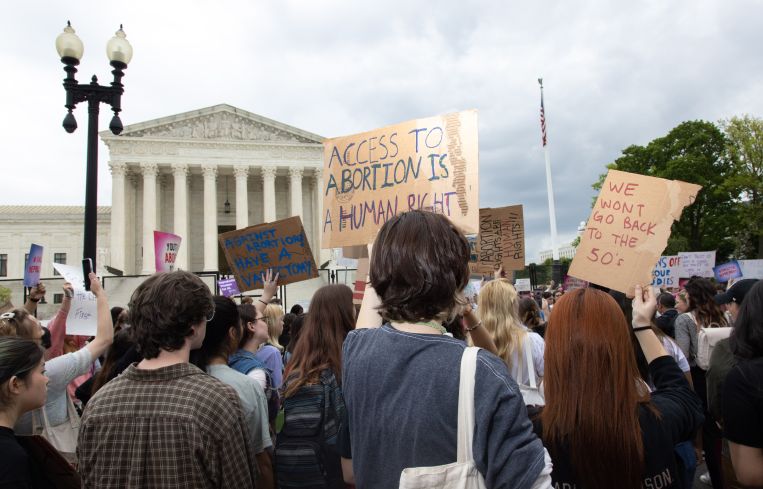Will Overturning Roe Reverse the Blue State Exodus?
By Julia Echikson May 6, 2022 12:45 pm
reprints
The revelation that the U.S. Supreme Court is gearing up to overturn Roe v. Wade — the landmark 1973 decision that legalized abortion nationwide — shocked the American public this week. After a draft of the decision by Justice Samuel Alito was leaked to Politico, protests erupted across the country as the nation faced the prospect that abortion could be illegal within weeks in at least 22 states.
If Roe is overturned, that reality will force a new calculus on Americans and American companies. The pandemic triggered a shift in migration patterns, with remote workers freer than ever to move away from their offices and out of cities, and white-collar workers moving South to generally more conservative states — a shift that the real estate industry is still grappling with.
Access to abortion and reproductive care is a significant enough issue that it could reverse some of those patterns, or perhaps become a factor as important as a state’s tax regime and business incentive package.
After Texas last year passed SB 9, a law that criminalized abortions after six weeks and allowed Texans to sue anyone who helps a woman access one, two-thirds of college-educated adults said they wouldn’t move there, according to one survey. Texas and Florida are the states that have seen the most inflow from office workers exiting the North and other areas over the last several years.
It’s, of course, too early to predict exactly what overturning Roe v. Wade will mean for the real estate industry. But so far, in Florida for example, the state’s rightward lean has not dissuaded newcomers. If anything, that’s what helped it soar.
During the height of the pandemic, when so-called blue states like New York and California imposed more stringent restrictions, closing all nonessential businesses, Florida bucked the trend. It enacted virtually no restrictions, allowing schools and restaurants to remain open. Northerners — many of whom are industry titans, such as billionaire financier Orlando Bravo and venture capitalist Keith Rabois — flocked to the state.
Florida lured the business community in part because of its right-wing politics. Unlike other coastal states, the Sunshine State offers low taxes and business-friendly governments and politicians, including Miami Mayor Francis Suarez, who famously tweeted in late 2020 “How can I help?” to encourage tech and finance companies to relocate.
When the firms did, their employees followed. Florida posted 10,522 new tech jobs last year — more than any other state besides Texas, according to a report by information-technology trade group CompTIA.
Since the arrival of new white-collar workers in 2020, Florida — long considered the swingiest of the swing states — has only become redder. Over the past year, the state’s Republican-controlled government passed some of the most conservative legislation in the country.
The most contentious laws revolve around schools, such as a ban on discussions about sexual orientation and gender identity in early elementary grades (which critics have descirbed as the Don’t Say Gay law), the rejection of math textbooks over fears they “indoctrinate” students, and limits on discussions about racism in classrooms.
The newly enacted laws have not stopped the business migration to Florida. “Talented people are voting with their feet — just like they’re voting to move to Miami,” Rabois, an early investor in PayPal and Linkedin who relocated from the Bay Area to Miami in 2021, told the New York Times earlier this year.
Florida Gov. Ron DeSantis, a Republican, is expected to win re-election this coming November, a sign of his statewide popularity.
If the Supreme Court’s leaked opinion becomes law, Florida is likely to ban abortions. While the state has not enacted a “trigger law” — legislation that would automatically outlaw the procedure should the high court overturn Roe — as 13 other states have, Gov. DeSantis last month signed into law a bill that bans abortions after 15 weeks of pregancy.
But politics isn’t the only factor that affects where people move. While the pandemic has given white-collar workers more freedom of movement due to remote and hybrid work, rising housing costs have made it more difficult for people with fewer resources to move, according to The Atlantic.
Florida is a prime example of that. South Florida now boasts some of the nation’s most expensive rents. Median monthly rates rose to $2,988, up by 57.2 percent over the past year — the highest jump of any region, according to Realtor.com. And in Miami-Dade County, the median price of a condominium rose by 31.1 percent to $400,000 since March 2021, per the Miami Realtors Association.
A statewide abortion ban is unlikely to hurt the CEOs and their white-collar staff who fueled Florida’s bull market. In a post-Roe America, a woman with the means and resources could travel across state lines and receive an abortion, while those without will have less access to abortion and fewer options in choosing where they live.
Julia Echikson can be reached at jechikson@commercialobserver.com.



